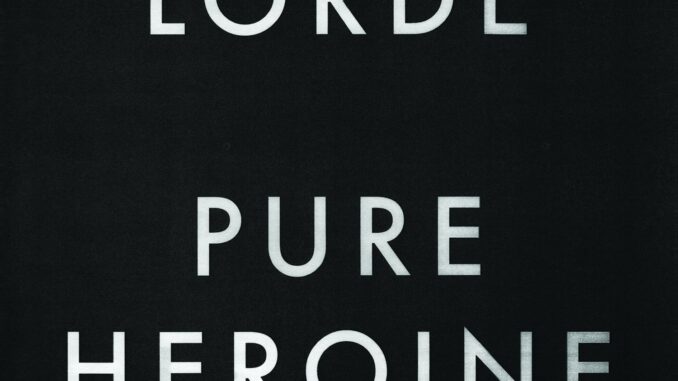
In 2019, just before the start of the new year, the Oracle staff picked its Top 25 Albums of the Decade. I, being a huge fan of Lorde, discussed her 2017 album Melodrama. Though Melodrama was voted onto the list by our staff, I actually much prefer Lorde’s 2013 album Pure Heroine (Extended), and I’ve been itching to talk about it ever since the release of that article.
Oozing teen angst and throbbing with zero f*ck energy, Pure Heroine is 21st century, working-class youth culture at its finest. This makes sense considering the New Zealand pop singer (real name: Ella Yelich O’Connor) was just 16 at the time of its release.
Right from the get-go, in her first track (Tennis Court) Lorde makes it known that she is “bored,” remarking that “they’ll never own [her].” She proves to us that not only is she too-cool-for-school, but she is aware of her own stereotype:
Baby, be the class clown, I’ll be the beauty
Queen in tears
It’s a new art form, showin’ people how
Little we care
This awareness, or meta-analysis of her and her peers’ angst, is almost from the perspective of the adult she has not yet become. And in that way, she lets listeners know within the first 30 seconds that this boredom is quasi-satirical in nature.
The contrast between child subject matter and adult analysis remains a constant theme in Pure Heroine. Lorde made it known to listeners that she was something of an old soul, with the jaded lyrics and vocals of “Royals,” bringing the song to the top of the Billboard’s Alternative Chart:
I’ve never seen a diamond in the flesh
I cut my teeth on wedding rings in the movies
And I’m not proud of my address
In a torn up town, no postcode envy
“Royals,” was the first song in 17 years by a solo female artist to reach that high of a standing. Perhaps because the very essence of the song was a slap in the face to other top artists flaunting their wealth. Lorde related to her listeners, empowering them as she admitted “We’ll never be Royals” but proudly chanted “We don’t care / we aren’t caught up in your love affair.”
Though the voice is mature and the lyrics are written with a poetic tightness that is wise beyond her years, the grittiness of coming-of-age remains loud and far from subtle in “The Love Club” track.
“I’m in a clique but I want out
It’s not the same as when I was punched
In the old days there was enough
The card games and ease with the bitter salt of blood”
The tales of this “clique” and the fact that she remarks “my mother’s love is choking me / I’m sick of words that hang above my head / what about the kid / it’s time the kid got free” before she invites listeners to “be a part of The Love Club” is a prime example of her youthful rebellion packaged into adult-like, reflective writing.
Rhythmically and vocally, Pure Heroine (and Pure Heroine (Extended)) is alternative pop at its finest. Most tracks in the album have a steady, thumping heartbeat and Lorde inserts layers of harmony that are choir-like and mysterious.
In my opinion, though she only sported two albums within the decade, Lorde was a top artist of the 2010s and Pure Heroine is indeed an artifact representing the archetype of Millennial or Gen Z youth.
